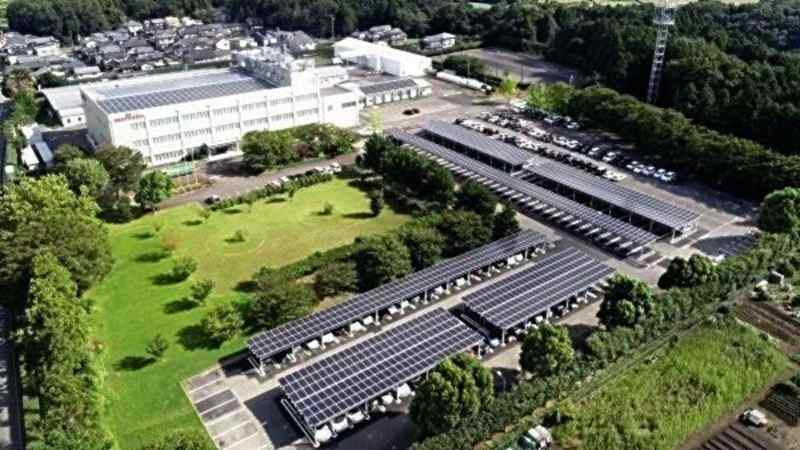
Kanazu Murata Manufacturing Co. in Awara, Fukui Prefecture, which installed solar panels on the roofs of factory and its parking lot
11:04 JST, December 30, 2021
Japanese manufacturers are scoring points toward achieving net-zero greenhouse gas emissions, but the high costs of achieving the government’s goals, including the implementation of renewable energy systems, remain a steep hurdle.
Companies are now rushing to introduce renewable energy sources, particularly on the heels of the recent COP26 U.N. climate summit held in Britain that set a goal of curbing temperature increases to less than 1.5 C. Their approaches include not only in-house power generation but also the procurement of renewable energy from other businesses.
Target of ‘100%’
In November, a subsidiary of Murata Manufacturing Co., which mainly produces electronic components for vehicles, mobile phones and computers, switched over to all-renewable energy sources for its electricity supply.
Kanazu Murata Manufacturing Co., based in Awara, Fukui Prefecture, has installed about 2,000 solar panels on the roofs of factory and its parking lot in the 44,000-square-meter complex, and it stores the generated electricity in lithium-ion batteries that it produces.
The solar power system has a capacity of 638 kilowatts, equal to about 13% of the electricity used by Kanazu Murata’s plant. The company buys electricity from renewable sources, such as wind and solar power providers from other businesses, to make up for the shortfall.
Murata plans to double its own power generation capacity within a few years and will introduce similar solar power systems to three domestic plants after April 2022.
“We are consuming a tremendous amount of electricity. We have a long way to go, but we want to promote renewable energy,” said Norio Nakajima, president of Murata Manufacturing. The company aims to increase the share of electricity generated from renewable sources to 100% by 2050, from about 15% in 2020, of all electricity consumed by the Murata Manufacturing group.
Panasonic Corp. has already achieved net-zero carbon dioxide emissions at its six plants in four countries, including Japan and the United States. The Kusatsu Factory in Shiga Prefecture plans to test a system that combines solar, fuel cells and lithium-ion batteries.
Since July, Shimadzu Corp. has been gradually switching electrical power consumed at its major domestic facilities, such as plants, to renewable sources. Each facility generates electricity in-house from solar power, among other sources, and purchases from other businesses. Shimadzu aims to make all the electricity used by its group companies renewable by 2050.
Introduced by only 10%
According to a survey conducted by Teikoku Databank Ltd. from December 2020 to January 2021, 82.6% of responding companies said they were working to curb greenhouse gas emissions.
By company size, 88.8% of large enterprises, 81.3% of small and medium enterprises, and 76.1% of micro enterprises said they are working to curb emissions. However, 43.4% of respondents said it would be difficult to achieve the government’s target of net-zero emissions by 2050.
The most common strategies in their efforts are the implementation of “energy saving” plans, followed by promoting the “Cool Biz” campaign for dressing lighter in the summer. More than 40% of respondents answered they were practicing both of them.
Meanwhile, the introduction of renewable energy sources such as solar and wind power ranked ninth in the survey at about 10%. Many micro, small, and midsize companies are believed to be unable to implement renewable energy sources until major cost reductions take place.
According to the Natural Resources and Energy Agency, the cost of generating onshore wind power is about ¥4.5 per kilowatt hour in major foreign countries, compared with ¥11.8 in Japan. The significant difference is because land suitable for onshore wind-power generation is scarce in Japan, which makes the cost of power generation higher.
To curb the costs of renewable energy, the Economy, Trade and Industry Ministry is helping private companies that develop low-cost offshore wind farms, and the ministry has introduced a bidding system for the sale of renewable electricity.
Some companies offer services that make it easier for their customers to introduce renewable energy, even if they don’t have the financial resources.
Sharp Corp. is among companies that install solar power generation facilities on the roofs of factories and commercial facilities free of charge to let them use electricity for a fee. Kyocera Corp. lends power generation facilities to newly emerged power companies.
These services will reduce the initial investment and maintenance costs of installing power generation facilities and make it possible to use renewable energy at a relatively low cost.
“It is necessary to expedite the development of low-cost renewable energy technologies, introduce a ‘carbon tax’ based on CO2 emissions, and use the tax revenue to help companies introduce renewable energy,” said Toshihide Arimura, professor of environmental economics at Waseda University.
Top Articles in Business
-

Prudential Life Insurance Plans to Fully Compensate for Damages Caused by Fraudulent Actions Without Waiting for Third-Party Committee Review
-

Narita Airport, Startup in Japan Demonstrate Machine to Compress Clothes for Tourists to Prevent People from Abandoning Suitcases
-

Japan, U.S. Name 3 Inaugural Investment Projects; Reached Agreement After Considerable Difficulty
-

Toyota Motor Group Firm to Sell Clean Energy Greenhouses for Strawberries
-

SoftBank Launches AI Service for Call Centers That Converts Harsh Customer Voices into Softer Voices
JN ACCESS RANKING
-

Japan PM Takaichi’s Cabinet Resigns en Masse
-

Japan Institute to Use Domestic Commercial Optical Lattice Clock to Set Japan Standard Time
-

Israeli Ambassador to Japan Speaks about Japan’s Role in the Reconstruction of Gaza
-

Man Infected with Measles Reportedly Dined at Restaurant in Tokyo Station
-

Videos Plagiarized, Reposted with False Subtitles Claiming ‘Ryukyu Belongs to China’; Anti-China False Information Also Posted in Japan






















